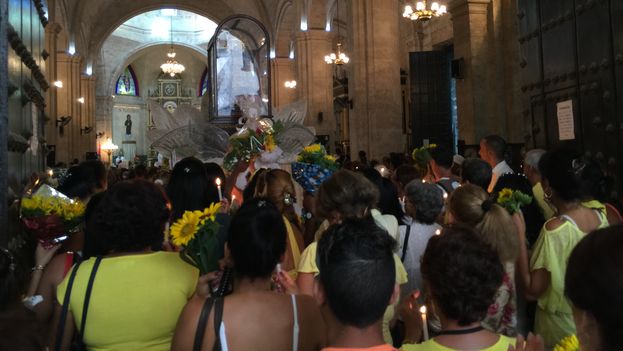
![]() 14ymedio, Havana, 24 January 2018 — Three Catholic priests have addressed a letter to President Raul Castro in which they ask the president to let Cubans “choose in freedom,” not vote. In this way, the priests warn, the island will have “different” political options to “prevent that one day, given whatever circumstances, Cuba is submerged in violent changes.”
14ymedio, Havana, 24 January 2018 — Three Catholic priests have addressed a letter to President Raul Castro in which they ask the president to let Cubans “choose in freedom,” not vote. In this way, the priests warn, the island will have “different” political options to “prevent that one day, given whatever circumstances, Cuba is submerged in violent changes.”
The signatories of the letter, written on the occasion of the twentieth anniversary of the “Mass of the Homeland” presided over by Pope John Paul II, and reproduced in full in a public letter, are Castor José Álvarez de Devesa, of Camagüey; José Conrado Rodríguez Alegre, from Trinidad, and Roque Nelvis Morales Fonseca, from Holguín.
“We want to choose in freedom. In Cuba there are votes, not elections. It is urgent to have elections where we can decide not only our future, but also our present. Now we are invited to ‘vote,’ to say ‘yes’ to what already exists and there is no willingness to change. Choosing implies, in itself, different options, choosing implies the possibility of taking several paths,” say the priests.
The three priests note that, “Since the institutionalization of the Communist Party as the only party authorized to exist, this people has never been allowed to raise a different voice,” and emphasize that all criticism has been silenced.
According to the authors of the letter, the political changes they defend must be accompanied by the creation of a “Rule of Law” in which there is a clear distinction between the executive, legislative and judicial powers, and their independence is guaranteed.
“We want our judges not to be pressured, for the law to be order, for illegality not to be a way of subsisting or a weapon of domination,” argues the letter, which at the same time demands that the Capitol be filled with legislators who represent the interests of their constituents.” The letter denounces “the lack of religious freedom” since “the Church is tolerated, but it is constantly monitored and controlled.”
The letter also states that the Government restricts the manner in which religion is practiced on the Island, and mentions by way of example that public processions or masses must have the express permission of the authorities, and if this is not granted no explanations are given.
The legalization of private and independent media is another of the demands of the letter, whose signatories note that the Church does not have free access to the mass media in Cuba and argue that the “monopoly and control of communication media means that nobody can access public media freely.”
“Cubans have the right to participate as investors in the economy and in our country’s negotiations,” demands the publication, which blames the “lamentable economic helplessness” that Cubans experience on the lack of opportunities for citizens to invest in the island on an equal basis with foreigners.
Nor has education been left out of the epistle, which notes that although education is a guaranteed right on the island and schooling is compulsory, there is a “teaching of a single way of thinking.” The letter defends young people’s right to “educational alternatives” and “options for the teaching of thought” and goes on to say that parents should have the right to choose “what kind of education they want for their children.”
In recent years several calls for attention from Catholic priests to the Government have had a great impact on national and international public opinion. In September of 1993, when the country was immersed in a deep economic crisis, the Cuban bishops released the pastoral “Love endures all things.”
Twenty years later, in 2013, another pastoral titled “Hope does not disappoint,” signed by 13 active bishops and Cardinal Jaime Ortega Alamino, addressed 43 points of the national reality that, from the perspective of the Cuban Catholic Church, should be improved.
Now, the three priests have chosen to publish their letter on a date to pay tribute to Archbishop Pedro Meurice Estiú, of Santiago de Cuba, who on January 24, 1998 gave a homily during the visit of Pope John Paul II to the island, an event at which Raúl Castro, then Minister of the Armed Forces, was also present. During the mass the Pope defined the Cuban people in a memorable way.
A growing number of Cubans “have confused the homeland with a party, the nation with the historical process we have experienced in recent decades and the culture with an ideology,” said the Archbishop at that time.
_________________________
The 14ymedio team is committed to serious journalism that reflects the reality of deep Cuba. Thank you for joining us on this long road. We invite you to continue supporting us, but this time by becoming a member of 14ymedio. Together we can continue to transform journalism in Cuba.
